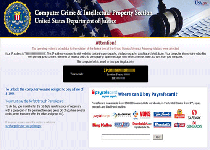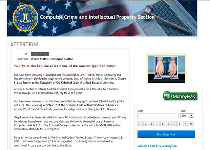‘Computer Crime & Intellectual Property Section’ Ransomware
 'Computer Crime & Intellectual Property Section' ransomware is a variant of the Trojan commonly-identified as Trojan:Win32/Reveton.A. Like Police Central e-crime Unit (PCEU) ransomware, the Strathclyde Police Ukash Virus, 'Poliisi Tietoverkkorikos Tutkinnan Yksikkö' Ransomware and similar ransomware Trojans from this family, 'Computer Crime & Intellectual Property Section' ransomware displays a fraudulent pop-up that claims that your PC is guilty of being used in various embarrassing crimes (such as distributing or viewing illegal forms of pornography). Regardless of the veracity of that accusation, 'Computer Crime & Intellectual Property Section' ransomware isn't affiliated with any type of law enforcement and doesn't have any legal right to block your PC, no matter what 'Computer Crime & Intellectual Property Section' ransomware claims. SpywareRemove.com malware researchers recommend a toll-free means of restoring your PC by deleting 'Computer Crime & Intellectual Property Section' ransomware in an anti-malware scan, although, sometimes, it may be also necessary to disable 'Computer Crime & Intellectual Property Section' ransomware before this will be practical.
'Computer Crime & Intellectual Property Section' ransomware is a variant of the Trojan commonly-identified as Trojan:Win32/Reveton.A. Like Police Central e-crime Unit (PCEU) ransomware, the Strathclyde Police Ukash Virus, 'Poliisi Tietoverkkorikos Tutkinnan Yksikkö' Ransomware and similar ransomware Trojans from this family, 'Computer Crime & Intellectual Property Section' ransomware displays a fraudulent pop-up that claims that your PC is guilty of being used in various embarrassing crimes (such as distributing or viewing illegal forms of pornography). Regardless of the veracity of that accusation, 'Computer Crime & Intellectual Property Section' ransomware isn't affiliated with any type of law enforcement and doesn't have any legal right to block your PC, no matter what 'Computer Crime & Intellectual Property Section' ransomware claims. SpywareRemove.com malware researchers recommend a toll-free means of restoring your PC by deleting 'Computer Crime & Intellectual Property Section' ransomware in an anti-malware scan, although, sometimes, it may be also necessary to disable 'Computer Crime & Intellectual Property Section' ransomware before this will be practical.
All the Reasons to Give 'Computer Crime & Intellectual Property Section' Ransomware's Ransom Zero Credibility
'Computer Crime & Intellectual Property Section' ransomware presents itself as an affiliate of the United States government as 'Computer Crime & Intellectual Property Section' ransomware uses a web page pop-up to cover the entire desktop of the infected computer. This pop-up warns that you've been caught indulging in illicit file-viewing activities and must pay a hundred dollar fine through Paysafecard or Moneypak. However, as a ransomware Trojan that's incapable of detecting any type of crime, 'Computer Crime & Intellectual Property Section' ransomware should always be treated as malicious and illegal software itself, equivalent to any other type of Trojan. SpywareRemove.com malware analysts also note that 'Computer Crime & Intellectual Property Section' ransomware may vary its pop-up warning according to the victim's location; this Trojan family has been observed to include numerous pop-up variants for different countries, particularly those based in Europe.
Although 'Computer Crime & Intellectual Property Section' ransomware's pop-up alert doesn't cause damage to your PC and, in fact, simply prevents you from interacting with the rest of your operating system, 'Computer Crime & Intellectual Property Section' ransomware may also download and install other PC threats with different attack capabilities. SpywareRemove.com malware analysts are especially concerned with the potential presence of PWS:Win32/Reveton.A, a related PC threat that's designed to steal passwords and equally confidential information.
Removing 'Computer Crime & Intellectual Property Section' Ransomware with a Less Than Hundred Dollar Charge
'Computer Crime & Intellectual Property Section' ransomware's ransom fee should never be paid, since 'Computer Crime & Intellectual Property Section' ransomware doesn't have any form of legal merit and isn't likely to unlock your PC even after its demands are met. Under normal circumstances, disabling 'Computer Crime & Intellectual Property Section' ransomware should be used as a preliminary step for enacting 'Computer Crime & Intellectual Property Section' ransomware's deletion safely as shown below:
- Booting your PC via a removable drive or network-accessible drive can help to launch an OS without launching 'Computer Crime & Intellectual Property Section' ransomware, which is likely to place itself in your default Startup folder. Safe Mode may also be useful for this purpose.
- After 'Computer Crime & Intellectual Property Section' ransomware is deactivated, SpywareRemove.com malware research team recommends scanning your PC with an anti-malware program that can detect 'Computer Crime & Intellectual Property Section' ransomware and any other PC threats that may be involved with 'Computer Crime & Intellectual Property Section' ransomware.
Because 'Computer Crime & Intellectual Property Section' ransomware and related PC threats often install themselves via malicious .dll files with random file names, you should also be comfortable with using anti-malware products to detect 'Computer Crime & Intellectual Property Section' ransomware prior to its installation, instead of trying to anticipate potential 'Computer Crime & Intellectual Property Section' ransomware attacks visually. 'Computer Crime & Intellectual Property Section' ransomware may be identified by various aliases, including Trojan.Win32.Reveton, Mal/Reveton-B, W32/Ransom.UK, Trojan-Ransom.Win32.Blocker, Win32/LockScreen.AJA Trojan, Trojan:Win32/Reveton.A and Trojan:Win32/Ransom.FL.

Technical Details
Registry Modifications
HKEY..\..\{Value}HKEY_CURRENT_USER\Software\Microsoft\Windows NT\CurrentVersion\Winlogon\Shell = "cmd.exe"
Additional Information
| # | Message |
|---|---|
| 1 | Computer Crime and Intellectual Property Section ATTENTION! IP: [IP ADDRESS] Location: [PC USER'S GEO LOCATION] Your PC is blocked due at least one of the reasons specified below. You have been violating Copyright and Related Law (Video, Music, Software) and illegally using or distributing copyrighted content, thus infringing Article 1, Section 2, Clause 8, also known as the Copyright of the Criminal Code of United States of America. Article 1, Section 2, Clause 8 of the criminal code provides for a fine of 2 to 5 hundred minimal wages or a deprivation of liberty for 2 to 8 years. You have been viewing or distributing prohibited Pornographic content (Child Porn/Zoophilia and etc). Thus violating article 202 of the Criminal Code of United States of America. Article 202 of the Criminal Code provides for a deprivation of liberty for 4 to 12 years. Illegal access has been initiated from your PC without your knowledge or consent, your PC may be infected by malware, thus you are violating the law on Neglectful Use of Personal Computer. Article 210 of the Criminal Code provides for a fine of up to $100,000 and/or deprivation of liberty for 4 to 9 years. Pursuant to them amendment to the Criminal Code of United States of America of August 28, 2012, this law infringement (if it is not repeated - first time) may be considered as conditional in case you pay the fine to the State. Fines may only be paid within 72 hours after the infringement. As soon as 72 hours elapse, the possibility to pay the fine expires and criminal case is initiated against you automatically within the next 72 hours! To unblock the computer, you must pay the fine through MoneyPak or $300. When you pay the fine, your PC will get unlocked in 1 to 48 hours after the money is put into the State's account. |
Leave a Reply
Please note that we are not able to assist with billing and support issues regarding SpyHunter or other products. If you're having issues with SpyHunter, please get in touch with SpyHunter customer support through your SpyHunter . If you have SpyHunter billing questions, we recommend you check the Billing FAQ. For general suggestions or feedback, contact us.